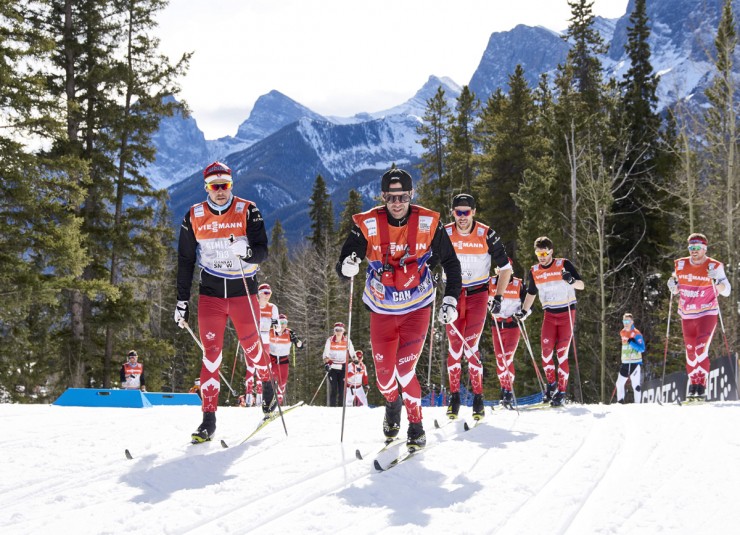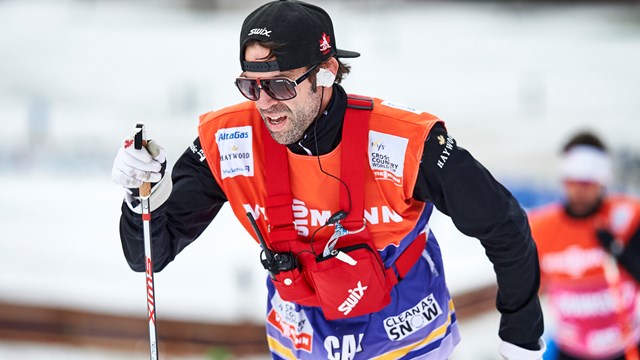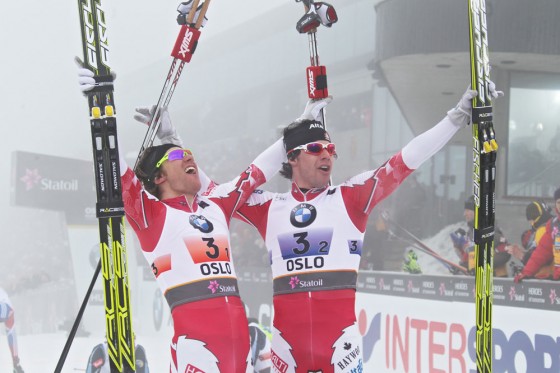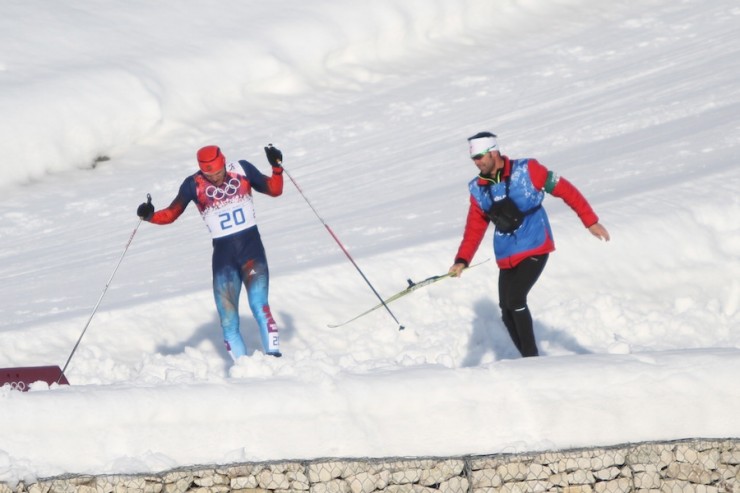
Since spring 2010, three-time U.S. Olympian Justin Wadsworth has served as head coach of the Canadian national team. On Monday of this week, Cross Country Canada (CCC) announced Wadsworth’s resignation, effective at the end of the 2016 race season, just days after the inaugural Ski Tour Canada (STC).
In a phone interview on Wednesday, Wadsworth, 47, a California native who lived in Bend, Ore., and now resides with his family in Canmore, Alberta, discussed his thoughts about a range of topics relating to his coaching career. He has led the team through its days as a fully funded program to more recent leaner fiscal times, as well as a World Championships gold medal in 2011.
FasterSkier: When you arrived home last Saturday evening after the STC and had a moment to exhale, what were your impressions of Canada’s first Tour?
Justin Wadsworth: Overall it was just a really great thing for all of the ski community in Canada. We had a lot of different crazy things happen. We had really good high-end results, we had some of our development skiers score their first World Cup points, we had other skiers really take away a lot from racing head to head against the world’s best. Each of the stops along the way during the Tour was a confirmation that skiing is alive and well in Canada. A lot of excitement and a lot of great volunteers that were willing to step up to the plate. I think the whole thing, when we look back on it, is a real positive, and for me as a coach of the national team, all the staff and athletes gave it everything they had. At the end of the day, when that happens, I actually don’t care as much about the results, it’s more about the process and everybody just giving it their all and that happened. I was impressed with the whole thing — all the coaches from the training centers and the club coaches that joined us worked together with the wax team. It was just a real positive, and I think it was a good stepping stone for our ski world in Canada.
FS: For athletes and spectators, really across the board, the Tour seemed to be a success. How do you build on that momentum and convince the majority of European athletes and national ski organizations to bring the World Cup to North America more often?
JW: I think the first thing you do is you get the big players in the game, like the Norways and the Swedens and other European countries — and also Canada and the U.S. because we are players, too — they all need to put the pressure on FIS [the International Ski Federation]. They actually need to make it a World Cup like other sports that are World Cup, say speed skating, biathlon, they go way more places than we do. What we have been competing in over the last thirty years is a European Cup. You can’t really count when you go a couple times a decade to a different continent as a World Cup. I think that would make things more interesting for all the skiers, it’s going to put financial pressure on different countries when they have to travel internationally. It’s just not right that North Americans and Japanese and Koreans and even Russians to a certain extent, pay the price for having to travel to Central Europe and Scandinavia to do all the competing. First, it’s financially hard long term and at the same time, it doesn’t ever give us the opportunity to race at the same level, on the same playing field — the same level playing field and we are living out of hotels all year. The Europeans got a little bit of taste of that for two weeks and we do the same thing all the time in Europe. I think putting pressure on the FIS from the ski community and even people like [U.S. Ski Team Head Coach] Chris Grover that leads the FIS Cross Country Committee and other people. We really need to keep putting pressure on the FIS to come to other places and we also need the U.S. to step up to the plate and start hosting some World Cups because they have been riding for free, getting quota for free on our World Cups up here. And you know what? I think it’s great, it’s a good opportunity for them, but it’s time for the power of the U.S. to step up to the plate and take some responsibility and developing skiers in North America by having World Cups in the U.S. and share some of the burden.
FS: Many of the European skiers remarked on the heavy travel load during the Tour’s first four stages. It was three different venues, all separated by long bus rides, in as many days. Are you thinking maybe a Tour concept where perhaps four stages are in Canmore and four due south in say, Soldier Hollow?
JW: I think there are a number of different options and the U.S. doesn’t have to start massive and have a Tour or anything, just hosting one World Cup. Next time it might not be a ski tour in North America and it could be two or three World Cups tops. Quebec, I’m sure, is game, Canmore is game, so one more stop either in the East or the West of the U.S. would be a perfect compliment and take some of that load or responsibility away from the Canadian organizing committee that really lays everything out there for North Americans. But you know, the U.S. kind of gets a ride on our coattails as far as the quota and everything else. We want to share, we want to be working with the U.S., but at the same time I don’t know how many years now, it’s been three World Cups that have happened in Canada with no reciprocation in the U.S. since the pre-Olympics in Soldier Hollow.

FS: In Canada, aren’t things a bit different in terms of seed money for big events like the Tour. Doesn’t the provincial government in Calgary provide money for the Canadian World Cups?
JW: For sure, the government money is more reliable probably, but they still have to make the ask for it, and there is still some financial risk involved with hosting. That’s why by the U.S. hosting one World Cup — I think they have done the same for alpine in the past and with a lot more regularity — they need to step up to the plate with cross-country skiing. I think they just, they really, I feel like they let down the U.S. Ski Team. You saw how many Americans want to watch cross-country skiing, in some places there were as many American fans at the Tour as their was Canadian fans. I’ve always pushed on this to [USSA Vice President Luke] Bodensteiner and other people, that that should happen, and they need to make it happen. Where there is a will there is a way. The World Cup started here in Canmore with one person, Dale Swanson, wanting to make it happen because [my wife] Beckie [Scott] and Sara [Renner] came to him because they said we really need World Cups at home for ourselves and also for our development.
FS: When you first came onto the Canadian scene as a coach in 2010, what were your impressions about the athletes and the culture?
JW: When I came into the program there was a lot of talented athletes: Alex and Devon and Ivan were all part of the team, and Chandra. And I knew [former head coach] Dave Wood well and I knew the program well, my wife was in the program over the years, and I’ve been quite close with that team. Dave had set up many good things and had done a lot of altitude prep training with his team. So when I came here, I felt like things were in relatively good shape. I also saw some opportunity to make some improvements in training, but especially try to have more consistent results with the best skiers. That was just one thing I saw, skiers having one or two results a year versus, if you can have one result a year, say a top five overall, like Devon had in 2008 or 2009, that should be possible many more times just with some small tweaks in training. I was also very grateful to have a good system in place and just saw some chances to work on the strength side of things, on technique, and also add some of my own personal touches in training. Of course all coaches are different and bring something new. Anytime you get a new coach, athletes get excited and are willing to work a little bit harder or at least a little more than for some of the coaches that have been around for awhile.
FS: What were some of those personal touches that allowed you to make your mark on the Canadian program?
JW: My philosophy has always been on the side of quality and making sure every workout has a purpose and is executed well. Whether that’s a simple two-hour run or a high-intensity lactate workout, each session has a real purpose. I had athletes emphasize, “What are you are trying to get out of that session physiologically?” and not be training for hours. I think that’s what I brought to the team. For example, Devon on the year he was second in the World Cup, he trained just over seven hundred hours because not everyone has to train more. A lot of it is about quality and just bringing the right focus and being rested for a lot of key workouts. I’ve also been heavy into technique. I really wanted to try to bring some technical improvements that I feel when I am skiing, and I think we are trying to bring that directly from past racers to my athletes. I think I have the feel and can describe the feel of certain techniques and those are two of my strengths.
FS: You were a World Cup and Olympic coach for the U.S. Ski Team. What were the major differences you saw between the two North American programs?
JW: It was like going into California in the 1800s, it was a gold mine. I mean, we had so much more of a budget here in Canada to do things, and to do things the right way. I always felt like the U.S. — and to their credit they have come a long way with the money they have — in the Canadian system, there is not as much nickel and diming. As a coach I could do things the right way. I had performance in the background, if it is not going to change performance, you should not spend money on it. It really needs to be performance based and driven, like the bus at Tour de Ski, and creating training camps to do things right at altitude. The way we were doing it at the time meant going to Hawaii, even though that camp cost us going to Park City. Some people saw it as an extravagance, but we had the resources to do things the best we could and we had a couple of skiers second and third overall in the World Cup. Everybody on the team had podiums and we had everybody in the [World Cup] Red Group for a while, those kind of things, when we spend money the right way, we are able to base things on performance and really push hard. I think the results come, of course, if you have the talent to do it as well.
“It was like going into California in the 1800s, it was a gold mine.” — Justin Wadsworth on transitioning to his role as Canadian head coach in 2010
FS: How long have you been contemplating stepping back? After the 2014 Olympics, it seemed like there was a rift within CCC’s coaching and management structure. Where did you stand emerging from those discussions that spring of 2014?
JW: Yeah, it was a lot of eggs in your basket, and then you don’t get the results and the outcome you want. You really need to think hard about a bunch of things and we did that. I had always had my eye on the long term with the team — four, six, eight, ten years — I’ve always wanted to be part of the system for a long time. I would say midway through the year this year, I started to feel like I wanted and needed to give the athletes more and especially in wintertime. In the summer, I live here in Canmore and I have really great access to them and we do a lot great training together. But in the winter, just traveling all the time, I had to scale back from what I had done in the previous quadrennial, and that’s when I started feeling, like, first, I am missing my family and having a hard time being away from them. The second part, I felt like the athletes always deserve the best. Maybe not being around for periods this winter wasn’t the best, for sure it was more about my family, but it was just in this last winter that I started to think about making some changes.
As the kids get older, when they are very young, even though it is extremely hard on Beckie to take care of them at a really young age, they don’t miss you, they don’t feel that piece of it. But now with them being older, I want to be around for them and show them that they are the most important thing in my life. They are ages now [5 and 8] that I can do things with them and we have a lot of fun as a family. We had a lot of fun when I was coaching and it was a big part of our lives for all of us, and I don’t think we would trade it, but it’s time to move on to normal lives and we’ll see if coaching is part of that in the future, but right now I’m going to take a break from that.
FS: And how did it work out in the spring 2014 when you remained head coach but were focused on athletes here in Canmore?
JW: Names had shifted or press releases came out, but really our coaching structure didn’t change much. We tried Tor Hetland for a year and he added some things to our program that were positive, and at the same time he didn’t work with our system maybe in the way we were hoping he would. So my role definitely went back to working a little bit closer with my personal athletes that I was coaching: Devon, Ivan, Lenny, Graeme Killick … because when Tor Hetland was there he definitely took over the reins a bit with those guys. We were supposed to work together a bit more, but he took over the reins a bit more and did things his way. I appreciate Hetland, he has a ton of good qualities as a coach and he is doing a good job with the Norwegians now, but at the time that role for me changed a bit. I wanted to be working with the athletes closer and so what I did this year more closely related to what I did from 2010 t0 2014. But also this year, I took on the added responsibility of all the logistics basically for the team, and a number of other things. Before I took that on, there was somebody else helping us. I had a big load this year, I did all the plane tickets, hotel reservations, logistics, a lot of working with the organizing, helping with the wax team and some of the stuff with the wax truck that we have. And all those things take time and energy along with normal head coach duty and camps and coaching my personal athletes. That was another small piece, it didn’t become overwhelming, but it was a lot to deal with and took a lot of my time, which left me with less time with my family.

FS: In your eyes, what is that missing piece that possibly prevents North America from having a consistent revolving wheel of top-tier skiers that, say, Norway has?
JW: I think that is a really easy thing to answer actually. It’s just the amount of competition our athletes see on a regular basis. It is that simple. Even if we send athletes on two trips a year as juniors, maybe twice a year, it costs quite a bit to send a junior to Europe twice in a season, even though they are for short periods of time and they are getting short exposure to racing, high level racing where they are pushing themselves or they learn new things. And until we go, “You know what?”, our base of skiers at a super-high level in North America will be in the same situation. I also feel like in conjunction with that is the age we feel like our skiers can train full time in an organized systematic professional way. That happens three or four years later than at the elite end in Europe. Just in high school here as a 17 year old you are not really getting pushed; it’s more still about fun. We don’t have the professional-based system like athletes 17 and 18 in Norway, where they are maybe part of a ski gymnasium, and they are educated in physiology, and they are racing at a high level and all those things happen, and our athletes don’t get that if they go to college, until they are out of college. Or if they choose not to go to college even, it take years to get the right skill level and get the right results. You can do that starting in your young twenties in the U.S. and Canada, but you have to be at a pretty high level for the U.S. or Canadians to take you internationally on enough trips and get enough exposure. So I really feel like we have to say we are going to be leaders in developing in general, and we can develop young skiers like Alex or Jessie, there are always outliers. But in general, our society just doesn’t promote endurance sports like cross-country skiing or lesser-known sports to be more professional and more organized at a young age.
However, we see it in hockey, we see it in basketball, and in our kind of sports, it’s more about having fun. But don’t get me wrong, I think at every level of your team you need to have fun, you need to enjoy the process, but I’m talking the difference of going on a two-hour mountain bike ride versus running or rollerskiing or something a little more focused like your counterpart would be doing in Norway.
It’s part of our society, but at the same time we are not organized and systematic at young ages. I’m talking 16 and 17. People say that’s too hardcore or too strict, or we are not having fun, but you can do all that you can still have fun, but also make those jumps at a younger age. Maybe we are just not setup for that, and that is why it’s tough getting people to accept that in North America.
FS: What do you remember as your proudest breakthrough moment as a coach?
JW: For sure, the gold medal in Oslo in the team sprint. Winning, not just getting a medal, but winning in Oslo and beating the Norwegians specifically and some of the choices we made a round that race. Both Devon and Alex skipped the 15 k leading into that race, which at the time was taking a chance because in the 15 k, both of them could have had a really good result. That was one of those things that no one ever realizes, that we made that call, they took a big risk and the risk paid off and that made it all the more sweet.
So that medal at World Championships 2011 for sure is massive. Historic at the time and it will always be the first gold medal won at the world championships by a male, I think by any Canadian.
The other thing, having and building a really tight team. We had a lot of years where our team was really tight, and waxing team, and the other coaches. I think that’s something I am really fond of and proud of, and I think that contributed to the results.

FS: What’s the redo? The thing you’d like another shot at?
JW: Of course Sochi happened, that was probably, if I had one thing I wished we could’ve changed, I really felt like those two weeks were tough on our team and we were there to medal. I really felt like the athletes were in great shape. It’s one of those things. The year after that we really worked hard with our wax team and tried to get better and better, do gap analysis on everything, and we still continue to do that. For a small team, we have come through in the big races at World Championships with medals in Falun and Val di Fiemme and Oslo. There are not many small countries that can do that and a lot of that goes to our wax team. In Sochi, I just wished we could have had a better opportunity to provide our athletes with even better skis.
FS: How old are your kids and what do you have planned in the near future?
JW: Teo is 8 and Brynn is 5. This summer, Beckie is working for WADA [World Anti-Doping Agency] in Rio and we are going to take the opportunity to go there as a family. After the Olympics, we’ll take a family trip to the Amazon. We have had some time in the past to do that, but it’s been really hard in the past to take three weeks and do something like that, it was impossible. Now, there are things I want time for and not to be worried that I’m not providing my athletes everything I can during those vacations. I just want to be stress free and released in my head about that.
FS: Last thoughts about coaching and where you stand?
JW: I don’t have feelings like I don’t want to do it, but I also don’t have feelings like I have to get back on the World Cup with another team next season. I am really in a good place. I want to keep helping the ski team in Canada and I’ll do that any way I can. I just need to take a break from coaching and being on the road. I’m wide open. If something else presents itself that gives me as much passion as skiing does, then I definitely would look at that as well. For me, and for Beckie as well, it’s about our passions. For her, it’s helping with the aboriginal youth in northern Alberta that are totally disadvantaged.
I have been really lucky coaching what I believe is the best team in the world and I’ve really enjoyed. it.
Jason Albert
Jason lives in Bend, Ore., and can often be seen chasing his two boys around town. He’s a self-proclaimed audio geek. That all started back in the early 1990s when he convinced a naive public radio editor he should report a story from Alaska’s, Ruth Gorge. Now, Jason’s common companion is his field-recording gear.



